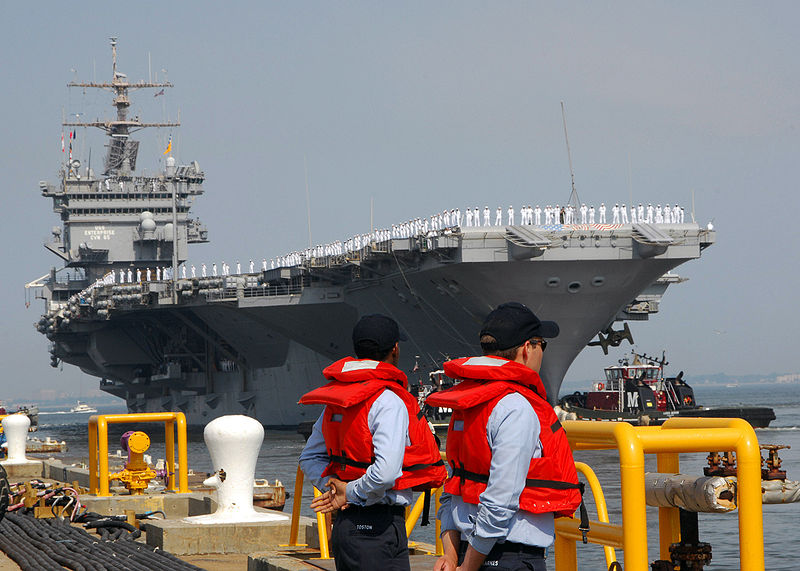
The relief of the commanding officer of the Enterprise resounds far beyond the person of Capt. Owen Honors. It impacts a storied warship, the Navy and the nation – all of whom deserve better. Leaving aside the separate issue of the propriety of Capt. Honors’ conduct, I am perplexed at his failure to recognize how much trouble these videos could buy for him, the Enterprise, the Navy and the nation.
How did this educated, experienced officer – a product of the Tailhook generation who has been in the mainstream Navy for close to 30 years – miss the signal that Navy leaders have been sending with clarity for the past two decades? How did an officer this accomplished not get the memo on the evolving standards for personal conduct?
There is no doubt Capt. Honors’ acts were undertaken in good faith, though with fatally poor judgment. “Duty – Honor – Country” only goes so far in motivating men and women to service in defense of their nation. The rest of the calculus is camaraderie, fraternity and esprit – shared misery and elation, common hardship and joy.
The videos were designed to mitigate the adversity of months of family separation and backbreaking hard work, using humor to accentuate the alliance between shipmates, male and female alike. Whether the videos constitute politically incorrect but harmless frat-party fun, or inappropriate, unwarranted harassment of select crew members, they should have been recognized by Honors and his staff as a really bad idea.
Except for the minority of sailors who were offended by the videos, Capt. Honors was known to his officers, senior enlisted and crew as a great commander and leader – not a tyrant, incompetent or reckless loose cannon of the sort that have come to public attention in recent years. I was aboard Enterprise about six weeks ago for a ship tour and cross-service familiarization. Every single officer and sailor I met was genuinely and sincerely motivated and professional, keenly aware of Enterprise’s legacy and proud to take this historic ship – the world’s first nuclear-powered aircraft carrier – back to sea one more time before the 50-year old carrier is decommissioned.
Leaders like Capt. Honors have a unique way of integrating professional execution of duty with gregariousness, sociability, humility and humor that draws people to them. But by failing to recognize and fully appreciate the risk this particular conduct posed in the current social and political environment, the commander erred in a way that hurt the ship, his officers and crew, the Navy and the nation. That is too bad, because for nearly three decades, the Navy has been preparing him for this duty – command of a carrier at sea during a time of conflict. But for these videos, he was probably the most well-qualified officer in the Navy to command Enterprise.
The object lesson for those of us in the service of our nation, particularly leaders in positions of great responsibility: Personal conduct that places a leader’s authority and credibility at risk is not just about that leader – it is also about national security and institutional prestige, and gaining return for the institution on the years and millions of dollars invested in developing officers as fit commanders and trustworthy leaders. By failing to see the risk in his conduct, Capt. Honors single-handedly wrote off a 30-year investment. Moreover, when the Navy invested in him as a carrier commander, it looked past dozens of other suitable, deserving candidates. Capt. Honors broke faith with these officers by failing to hold up his end of the bargain. His actions were the naval equivalent of winning an auction for a rare painting and throwing it into a roaring fireplace in a room full of art collectors.
Enterprise will put to sea with a new command team. That team, while likely formidable, will be a suboptimal solution for the deployment – commanders are not fungible. How the change will affect Enterprise’s performance at sea is unknowable. Maybe there will be no discernible consequence, and she will distinguish herself once again in a manner befitting her legend. Or maybe relief of a beloved commander on the eve of deployment will work small and subtle mischief to the morale and performance of the crew. Maybe Enterprise will accomplish just a little less than she could had Honors not compromised his command.
That the Navy groomed Capt. Honors and entrusted the ship to his command means that the Navy believed him to be the best man for the job. He undermined that trust. It remains to be seen whether that will impact Enterprise’s performance at sea and thus will impact the security of the United States and the prestige of the Navy. If it does, then Capt. Honors’ shame looms larger than ever.
LtCol Butch Bracknell is the Commandant of the Marine Corps Fellow at the Atlantic Council. This column first appeared in the San Diego Union Tribune.
Image: enterprise-deployed.jpg
